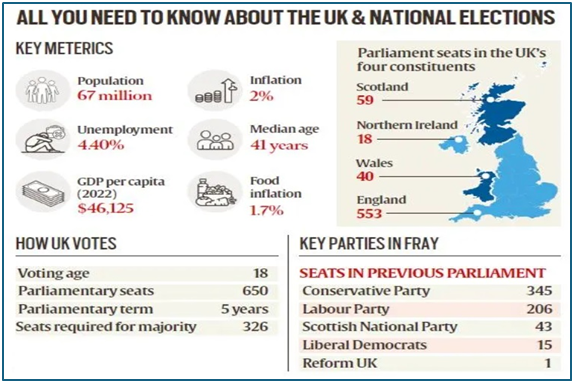Why in news?
The United Kingdom is all set for a crucial general election today (July 4). Rishi Sunak, the current Prime Minister of the United Kingdom, called a snap general election for July 4, 2024, even though the next election was not required until December 2024.
Experts and polling data suggest a landmark election is imminent, with the Labour Party likely to end the Conservatives' 14-year rule.
What’s in today’s article?
- Nature of Parliament
- Nature of the Governance System
- Voting System of the United Kingdom
- What Labour’s win could mean for India-UK FTA?
Nature of the Parliament of UK
- The UK Parliament is a bicameral legislature, consisting of two houses:
- House of Commons
- The lower house, made up of 650 MPs elected by the public through FPTP.
- 533 for England; 59 for Scotland; 40 for Wales; 18 for Northern Ireland
- It is the primary legislative body, responsible for making and passing laws.
- The party (or coalition) with the majority of seats forms the government, and its leader becomes the Prime Minister.
- The opposition is made up of MPs from parties not in government.
- House of Lords
- The upper house, which is unelected and includes life peers, bishops, and hereditary peers.
- It reviews and suggests amendments to legislation proposed by the House of Commons.
- While it can delay legislation, it cannot ultimately prevent bills passed by the Commons from becoming law.
Nature of the Governance System
- The United Kingdom operates under a constitutional monarchy and a parliamentary democracy. Key features include:
- Monarch
- The head of state is the monarch, currently King Charles III.
- The role is largely ceremonial, with real political power vested in elected bodies.
- Prime Minister
- The head of government is the Prime Minister, who is the leader of the majority party in the House of Commons.
- The Prime Minister is appointed by the monarch and is responsible for running the government, making policy decisions, and representing the UK domestically and internationally.
- Cabinet
- Comprises senior government ministers chosen by the Prime Minister.
- Ministers are typically heads of government departments and are responsible for implementing government policy.
Voting System of the United Kingdom

- Background
- The House of Commons, Scottish Parliament, Welsh Parliament, Northern Ireland Assembly and UK local authorities use different voting systems.
- First-past-the-post
- The House of Commons, mayoral elections in England, Police and Crime Commissioner elections and local councils in England and Wales use the first-past-the-post system.
- Voters select their preferred candidate. The candidate with the most votes wins.
- Formation of the government
- If a single party wins a majority of the 650 seats, their leader will become the new Prime Minister.
- If no party achieves a majority, a hung parliament will be declared, and the largest party may attempt to form a coalition government.
- In this year’s election, the two main contenders for Prime Minister are Rishi Sunak of the Conservative Party and Keir Starmer of the Labour Party.
What Labour’s win could mean for India-UK FTA?
- Background
- India and UK have been negotiating a proposed free trade agreement (FTA) for more than two years to boost trade between the two nations.
- The agreement could result in a mutual tariff relaxation on a range of goods such as cars, clothes, alcoholic beverages, and medical instruments.
- However, a landslide victory for the Labour Party in the UK elections could lead to a change in the dynamic of the FTA negotiations.
- Political certainty might be beneficial for the deal
- Since the UK's unexpected referendum to leave the European Union, London has lacked the political stability needed to negotiate a trade deal with India, which has a high tariff regime.
- However, if Labour wins decisively, there might be enough political stability to sign such a deal.
- Growing support for India in the current Labour Party
- Under Keir Starmer, Labour party has changed. It is not the same party as that headed by his predecessor, Jeremy Corbyn, who called for international intervention in Kashmir.
- Starmer has recognised the growing political clout of the UK’s Indian origin population — the largest immigrant group in the country.
- Visas a likely sticking point
- Immigration remains among the most heated issues in British politics. This could be a sticking point for a trade deal with India.
- New Delhi is seeking temporary visas for its service sector workforce under the FTA — this is where it expects to gain the most in the deal.
- With the UK being a powerhouse in the IT and financial services segment, India’s service sector could benefit from the integration.
- But given the UK’s political climate, Labour is likely to negotiate hard on the visa issue.
- Tougher negotiations on climate
- India will also likely face tougher negotiations on climate from a Labour government.
- India has sought a relaxation on the carbon tax that the UK is expected to implement along the lines of the EU.
- A carbon tax is a government-imposed price that emitters pay for each ton of greenhouse gas (GHG) emissions they release.
- New Delhi argued during the FTA negotiations that the proposed carbon border adjustment mechanism could take away much of the tariff concessions agreed during the FTA.










